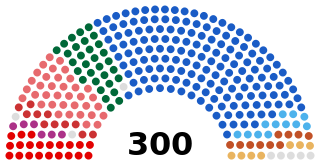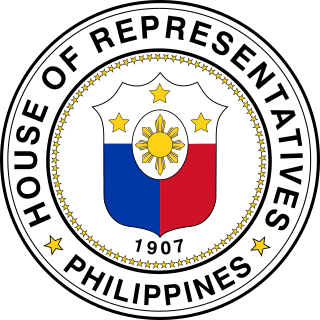President of the Senate is a title often given to the presiding officer of a senate. It corresponds to the speaker in some other assemblies.

The speaker of the House of Representatives is the presiding officer of the Australian House of Representatives, the lower chamber within the Parliament of Australia. The counterpart in the upper house is the president of the Senate. The office of the speakership was established in 1901 by section 35 of the Constitution of Australia. The primary responsibilities of the office is to oversee house debates, determine which members may speak, maintain order and the parliamentary and ministerial codes of conduct during sessions and uphold all rules and standing orders. The current speaker of the House of Representatives is Milton Dick, who was elected on 26 July 2022.

The president of the Senate is the presiding officer of the Australian Senate, the upper house of the Parliament of Australia. The counterpart in the lower house is the speaker of the House of Representatives. The office of the presidency of the senate was established in 1901 by section 17 of the Constitution of Australia. The primary responsibilities of the office is to oversee senate debates, determine which senators may speak, maintain order and the parliamentary code of conduct during sessions and uphold all rules and orders of the senate. The current president is Sue Lines, who was elected on 26 July 2022.

The Congress of Deputies is the lower house of the Cortes Generales, Spain's legislative branch, the upper house being the Senate. The Congress meets in the Palace of the Parliament in Madrid.

The speaker of a deliberative assembly, especially a legislative body, is its presiding officer, or the chair. The title was first used in 1377 in England.

In New Zealand, the speaker of the House of Representatives, commonly known as the speaker of the House, is the presiding officer and highest authority of the New Zealand House of Representatives. The individual who holds the position is elected by members of the House from among their number in the first session after each general election. They hold one of the highest-ranking offices in New Zealand. The current Speaker is Gerry Brownlee, who was elected on 5 December 2023.

The speaker of the Senate of Canada is the presiding officer of the Senate of Canada. The speaker represents the Senate at official functions, rules on questions of parliamentary procedure and parliamentary privilege, and presides over debates and voting in the chamber. The office of the speaker is held by Raymonde Gagné who has held the position since May 16, 2023.

The Parliament of the Hellenes, commonly known as the Hellenic Parliament is the unicameral legislature of Greece, located in the Old Royal Palace, overlooking Syntagma Square in Athens. The parliament is the supreme democratic institution that represents the citizens through an elected body of Members of Parliament (MPs).

The National Assembly is Mauritius's unicameral legislature, which was called the Legislative Assembly from 1968 until 1992, when the country became a republic. Prior to 1968 and under British rule it was known as the Legislative Council. The Constitution of Mauritius provides for the parliament of Mauritius to consist of the President and the National Assembly. The parliament of Mauritius is modelled after the Westminster system of parliamentary democracy, where members of parliament are voted in at regular general elections, on the basis of a first past the post system. The working language of the National Assembly is English.

The speaker of the House of Representatives of the Philippines, more popularly known as the House speaker, is the presiding officer and the highest-ranking official of the lower house of Congress, the House of Representatives, as well as the fourth-highest official of the government of the Philippines.

The speaker of the Legislative Assembly of Queensland is elected by the members of the Queensland Legislative Assembly to preside over sittings of the Assembly and to maintain orderly proceedings. The Speaker must be a member of the Legislative Assembly. The position is currently held by Curtis Pitt, a former Treasurer of Queensland who was elected to the post on 13 February 2018.

The Speaker of the Parliament of the Democratic Socialist Republic of Sri Lanka is the presiding officer of the chamber. The current Speaker of the Parliament is Mahinda Yapa Abeywardena, in office since 20 August 2020. The Speaker fulfills a number of important functions in relation to the operation of the House, which is based upon the British Westminster parliamentary system.

The president of the Congress of Deputies is the speaker of the Congress of Deputies, the lower house of the Cortes Generales. The president is elected among the members of the Congress and is, after the king and the prime minister, the highest authority in the Kingdom of Spain.

The Sabah State Legislative Assembly is a part of the legislature of Sabah, Malaysia, the other being the governor of Sabah. The assembly meets at the Sabah State Legislative Assembly Building at Likas in the state capital of Kota Kinabalu.

The president of the Senate is the presiding officer of the Spanish Senate, the upper house of Spain's Cortes Generales. It is the fourth authority of the country after the Monarch, the Prime Minister and the President of the Congress of Deputies. The president is elected among and by the incumbent senators. When the president is unable to exercise power, vice presidents of the Senate exercise the powers of the Senate president.

The Speaker of the Jatiya Sangsad is the presiding officer of the Parliament of Bangladesh. The speaker is elected generally in the first meeting of the parliament following general elections by Members of Parliament. Serving for a term of five years, the speaker chosen from sitting members of the parliament, and is by convention a member of the ruling party or alliance.

The Board of Spokespersons is a parliamentary body of the Cortes Generales mainly entrusted with the task of ordering the agenda of the Parliament. As a bicameral legislature, the Cortes Generales are formed by two houses, the Senate and the Congress of Deputies. The Board meets every week.

Parliamentary groups in Spain are the union of members of parliament who may or may not belong to the same political party, but with the same or similar political ideology. The figure of the parliamentary group is common to the Cortes Generales, the national parliament of Spain, and the regional legislatures.

The Permanent Deputation, in Spain, is a parliamentary body consisting of a reduced number of members of parliament which assume the legislative powers of the Parliament when it is not in session. The members of this body are chosen proportionally to the number of deputies that each political group has. The chair of a permanent deputation is normally the speaker of the Parliament.

The Thirtieth Legislature of Albania, officially known as the IX Pluralist Legislature of Albania, is the legislature of Albania following the 2017 general election of Members of Parliament (MPs) to the Albanian Parliament. The party of the Prime Minister Edi Rama, PS, obtained an absolute majority of 74 deputies, alongside its ally, the Social Democratic Party (PSD), which secured 1 seat and Party for Justice, Integration and Unity (PDIU) 3 seats.


















